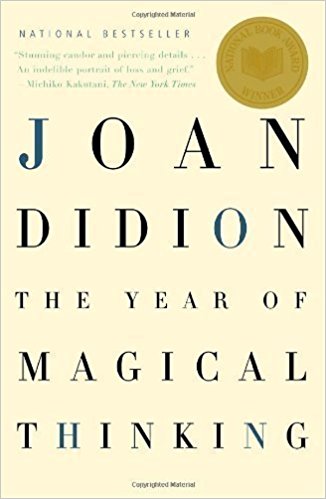Summary | Excerpt | Reading Guide | Reviews | Beyond the Book | Readalikes | Genres & Themes | Author Bio

Chapter 1
1
Life changes fast.
Life changes in the instant.
You sit down to dinner and life as you know it ends.
The question of self-pity.
Those were the first words I wrote after it happened. The computer dating on the Microsoft Word file
("Notes on change.doc") reads "May 20, 2004, 11:11 p.m.," but that would have been a case of my opening the file and reflexively pressing save when I closed it. I had made no changes to that file in May. I had made no changes to that file since I wrote the words, in January 2004, a day or two or three after the fact.
For a long time I wrote nothing else.
Life changes in the instant.
The ordinary instant.
At some point, in the interest of remembering what seemed most striking about what had happened, I considered adding those words,
"the ordinary instant." I saw immediately that there would be no need to add the word
"ordinary," because there would be no forgetting it: the word never left my mind. It was in fact the ordinary nature of everything preceding the event that prevented me from truly believing it had happened, absorbing it, incorporating it, getting past it. I recognize now that there was nothing unusual in this: confronted with sudden disaster we all focus on how unremarkable the circumstances were in which the unthinkable occurred, the clear blue sky from which the plane fell, the routine errand that ended on the shoulder with the car in flames, the swings where the children were playing as usual when the rattlesnake struck from the ivy.
"He was on his way home from work—happy, successful, healthy—and then, gone," I read in the account of a psychiatric nurse whose husband was killed in a highway accident. In 1966 I happened to interview many people who had been living in Honolulu on the morning of December 7, 1941; without exception, these people began their accounts of Pearl Harbor by telling me what an
"ordinary Sunday morning" it had been. "It was just an ordinary beautiful September
day," people still say when asked to describe the morning in New York when American Airlines 11 and United Airlines 175 got flown into the World Trade towers. Even the report of the 9/11 Commission opened on this insistently premonitory and yet still dumbstruck narrative note:
"Tuesday, September 11, 2001, dawned temperate and nearly cloudless in the eastern United
States."
"And then—gone." In the midst of life we are in death, Episcopalians say at the graveside. Later I realized that I must have repeated the details of what happened to everyone who came to the house in those first weeks, all those friends and relatives who brought food and made drinks and laid out plates on the dining room table for however many people were around at lunch or dinner time, all those who picked up the plates and froze the leftovers and ran the dishwasher and filled our (I could not yet think my) otherwise empty house even after I had gone into the bedroom (our bedroom, the one in which there still lay on a sofa a faded terrycloth XL robe bought in the 1970s at Richard Carroll in Beverly Hills) and shut the door. Those moments when I was abruptly overtaken by exhaustion are what I remember most clearly about the first days and weeks. I have no memory of telling anyone the details, but I must have done so, because everyone seemed to know them. At one point I considered the possibility that they had picked up the details of the story from one another, but immediately rejected it: the story they had was in each instance too accurate to have been passed from hand to hand. It had come from me.
Another reason I knew that the story had come from me was that no version I heard included the details I could not yet face, for example the blood on the living room floor that stayed there until José came in the next morning and cleaned it up.
Excerpted from The Year of Magical Thinking by Joan Didion Copyright © 2005 by Joan Didion. Excerpted by permission of Knopf, a division of Random House, Inc. All rights reserved. No part of this excerpt may be reproduced or reprinted without permission in writing from the publisher.






Your guide toexceptional books
BookBrowse seeks out and recommends the best in contemporary fiction and nonfiction—books that not only engage and entertain but also deepen our understanding of ourselves and the world around us.